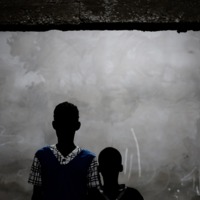There are an estimated 43,000 people living in conditions of modern slavery in Mauritania, including up to 20,000 in forced labour. Slavery is entrenched in Mauritanian society, with slave status deeply rooted in social caste and being inherited from generation to generation. Of those in forced labour, Walk Free survey results estimate approximately 42 percent were exploited for domestic work. Forced labour in the domestic sector commonly includes women performing domestic chores, such as fetching water, gathering firewood, preparing food, pounding millet and caring for their master's children. Men and boys enslaved in the domestic sector typically herd animals (camels, cows, goats) or are forced to work in the fields.
Said Ould Salem, now 16, and his brother Yarg, 13, were born into slavery to the wealthy El Hassine family in Mauritania, having inherited the slave status from their mother. They worked all days from a very early age whilst their master’s children went to school and played football. The boys managed to escape in April 2011 thanks to the help of SOS-Esclaves. Later, with the help of Anti-Slavery International, their master became the first slave-owner ever prosecuted for slavery in Mauritania’s history. However, he was released on bail until the appeal.
The boys waited for the appeal for nearly five years. With Anti-Slavery’s support, their case was taken by Minority Rights Group International (MRG) to an African Union court in 2016, prompting a response from Mauritanian authorities and organising the appeal hearing in November 2016. The Court of Appeal increased the level of compensation awarded to the boys. However, their former slave owner’s sentence has remained unchanged, requiring him to serve only two years, when the law requires 5-10 years for the crime of slavery. The boys’ lawyers will appeal the sentence to the Supreme Court. Meanwhile, Said and Yarg are both in secondary school and respectively dream of becoming a human rights defender and a lawyer.










